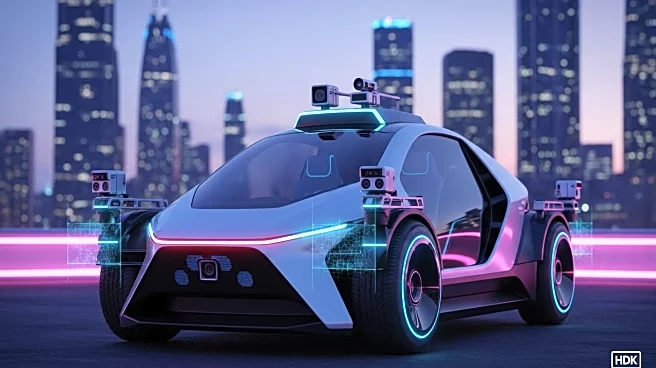What's Happening?
Nissan has introduced its next-generation ProPilot advanced driver-assistance system (ADAS) in Tokyo, featuring a fleet of Ariya electric SUVs equipped with the new technology. This system integrates Nissan's SAE Level 2+ Ground Truth Perception hardware suite, which includes LiDAR, radar, and cameras, with Wayve's AI Driver software. The collaboration aims to deliver human-like performance in dense city traffic, enhancing the vehicle's ability to navigate complex urban environments. The unveiling marks a significant step in Nissan's efforts to advance autonomous driving capabilities, leveraging AI to improve safety and efficiency in urban settings.
Why It's Important?
The introduction of Nissan's next-gen ADAS system represents a pivotal advancement in automotive technology, particularly in the realm of autonomous driving. By integrating AI with traditional hardware, Nissan aims to enhance the safety and reliability of its vehicles in urban traffic conditions. This development could significantly impact the automotive industry by setting new standards for driver-assistance systems, potentially influencing other manufacturers to adopt similar technologies. The collaboration with Wayve also highlights the growing importance of partnerships between automotive companies and tech firms in driving innovation. Consumers stand to benefit from improved safety features and more efficient navigation in city environments.
What's Next?
Nissan plans to continue refining its ProPilot system, with potential expansions into other vehicle models and markets. The company may also explore further collaborations with tech firms to enhance its AI capabilities. As the system is tested and validated, regulatory approvals will be crucial for broader deployment. Stakeholders, including city planners and policymakers, may need to consider infrastructure adaptations to accommodate advanced autonomous systems. The success of this initiative could prompt other automakers to accelerate their own autonomous driving projects, potentially leading to increased competition and innovation in the sector.
Beyond the Headlines
The integration of AI into driver-assistance systems raises important ethical and legal questions regarding liability and safety standards. As vehicles become more autonomous, the responsibility for accidents may shift from drivers to manufacturers, necessitating new legal frameworks. Additionally, the reliance on AI for navigation and decision-making could lead to concerns about data privacy and cybersecurity, as vehicles collect and process vast amounts of information. Long-term, this technology could contribute to a reduction in traffic congestion and emissions, aligning with broader environmental goals.








